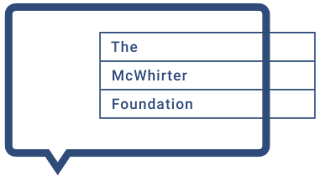Disagreement and debate are the lifeblood of democracy
Alasdair McWhirter | McWhirter Foundation Chair
If you are one of our alumni and reading this, the chances are you are bright and may well go on to achieve great things in whatever career you choose. Whether that turns out to be in AI, fashion, medicine, politics, protecting the environment or something completely different, find the courage to say what you think about the things that matter to you, particularly when your view is different to that of your friends.
Social media has its good side but it has also led to a world in which there is a ‘received’ view on most important social, moral and political questions for any given peer group. Disagreeing with that view can feel quite scary, so many people choose to go with the flow and not really think about what may be an important issue. The problem is that ‘accepted’ views can often end up being far too simplistic, leaving little room for nuance, let alone outright disagreement.
Will putting pressure on museums to weed out exhibits which have a link to slavery really make this world a better place? Isn’t it more important that we understand what happened in our past and why – so we are better placed to guard against anything similar ever occurring in the future?
On one hand, social media has turned many people into ‘sheep’, on the other it has also led to opinions becoming polarised, as like-minded groups reinforce one another’s views – even when they are highly dubious. Neither situation is either helpful or healthy for society.
Over the next 25 years the world will see huge changes and to make the most of them we need a constant flow of new and original ideas. In a small way, you will hopefully contribute to that flow and help to determine the path it eventually takes, by supporting views you agree with and questioning those you don’t – and speaking out. Choosing your words carefully will hopefully prevent you causing any offence and, far more often than not, earn respect rather than ridicule.
However, opinions only become worth listening to when they are informed by experience or knowledge and knowledge needs to be based on the truth, which, unfortunately, has become increasingly difficult to pin down. It gets buried by the avalanche of information that the internet and our mobiles, iPads, laptops and TVs now overflow with, much of which is inaccurate or misleading. Spinning a story has become standard practice for governments as well as the media and big business. A government pretending that money which has already been promised to its health service is some wonderful new act of benevolence, a newspaper always searching for fault and exaggerating every nasty little detail, or a food company presenting a fruit yoghurt as ‘super healthy’ when a fifth of it is actually sugar, are all simple examples.
To work out what we do and don’t know, or believe in, we all have to pick our way through a swamp of selective truths, marketing spiel, sensationalism and fake news. Not easy. The depressing lack of accuracy and honesty makes it all the more important for us to talk to one another and share whatever conclusions we’ve reached. Listening to others and discussing a topic is one of the best ways to learn, to refine your opinions and encourage others to do same. Expressing your views will also help you find your voice, discover who you are and work out where you want to go.
No one should ever underestimate the value of their opinion. Having a good education is a privilege that adds an extra layer of responsibility to speak out. People who choose to just sit there and nod silently, even when they don’t agree, make it easier for those with power, or a particular political motive, to shape public opinion and set the agenda.
Disagreement and debate are the lifeblood of democracy.
Say what you think essay competition
Our Foundation Chair, Alasdair McWhirter has below written the piece entitled "Disagreement and debate are the lifeblood of democracy". In the spirit of this topic, we are running a short essay competition, the winner of which will be published in the following newsletter. The requirements for the competition are as follows:
A 500 word essay on the topic "Disagreement and debate are the lifeblood of democracy". You may choose to submit a piece responding to some of Alasdair's points, or a completely new take on the topic. Pieces will be judged on strength of argument, creativity and 'outside the box' thinking. Submissions are due 15th November 2021. Please send your essay or any questions to eva@mcwhirterfoundation.org.au
We look forward to hearing what you have to say!


No comments:
Post a Comment